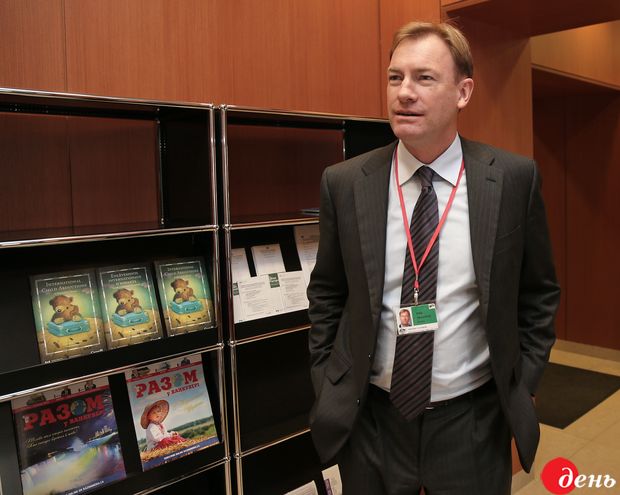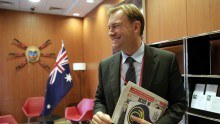Australia has opened its embassy in Ukraine and sent a full-fledged ambassador to Kyiv for the first time in 23 years of independence. Before this, the head of the “kangaroo country’s” diplomatic mission in Warsaw, concurrently non-resident ambassador to Ukraine, performed this duty. Incidentally, the Australian Embassy is in fact located on the premises of Canada’s Embassy in Ukraine. The first question we put to Ambassador Doug TRAPPETT, who agreed to grant his first interview as holder of this office to The Day, is why, of all countries, Canada was chosen to share an embassy with.
“It’s an interesting story about already close political links between Australia and Canada becoming even closer, as well as the decline in budget funding for diplomatic services that is happening in many countries around the world. On the political side, Australia and Canada obviously share a lot of common views on world events – particularly in Ukraine – and we’re not in great competition either in Ukraine or just about anywhere around the world. So, it was an easy fit in political and policy terms to come together like this. The other part is that the budgets of foreign services in middle-sized countries like Canada and Australia have been under pressure for at least the past decade, if not longer, to find savings. In those parts of world where Canada has a large presence and Australia has only a modest presence like here in Ukraine, it makes sense for us to share the administrative, financial, property, and corporative services of our friend and partner to go about managing our operations. Perhaps in the South Pacific and South East Asia Australia will soon be hosting Canadian diplomats in our embassies. In fact I know that this is under formal consideration in a range of places around the world. But this initiative here in Kyiv is the first time we have done it.”

Mr. Ambassador, what were the main reasons for your country this year to open embassy here, in Kyiv?
“There are several reasons, but the main reason is MH17. As you know, 28 Australian citizens and 10 people who had permanent residency in Australia were killed in that atrocity. So, we are now working closely with Ukraine, The Netherlands, Malaysia, and Belgium as part of the investigation. My job is to perform the diplomatic role of making sure the investigation goes as smoothly as possible. The next reason why we are here, of course, is because of Russia’s continuing destabilization of Ukraine. Australia wants to show – as my Prime Minister, Tony Abbott, made very clear when he announced that we would have an interim embassy here – that Australia is a strong supporter of Ukraine’s territorial integrity and sovereignty. And I guess the next main reason we are here is just to develop the bilateral relationship and see in what areas Australia and Ukraine can do more together.”
I have seen article with the headline “Ukrainian forces fight pro-Russian rebels in Australian boots.” So, we thank Australia for such aid. Head of the Union of Ukrainian Organizations of Australia Stefan Romaniv said recently that Ukrainian Diaspora will ask Australia for lethal weapons. What can you say about such a demand?
“I know Stefan well. Regarding the supply of lethal weapons to Ukraine at this stage we do not have any plans at this point to do so.”
Because there is not such demand from Ukraine or are there other reasons?
“The main reason is because it is not our policy at the moment to provide lethal weapons to Ukraine. As you know, other larger countries that happen to be friends of ours are thinking about these sorts of things but have not yet ventured into that territory. We will follow their lead. If the circumstances in Ukraine change, perhaps, we will change our policy.”
Are there any new plans to send some development assistance to Ukraine?
“We have just arrived in Kyiv – I myself and our embassy – and we are looking at all of these sorts of options. At the moment I am pursuing meetings with Ukrainian ministers and senior officials, not just in defense, but in other fields to discuss options. We are looking for areas where we can assist. At this stage we are sort of in exploratory territory rather than announcing big initiatives.”
We thank Australia for its strong stand against Russian aggression. Just recently, on March 31, your country imposed sanctions against Russia. Do you think that sanctions will have impact on Russian behavior towards Ukraine?
“Yes, I think they are having an effect. One thing that a lot of critics of the strength of the sanctions that have been put in place to date do not appreciate is that they introduce an element of uncertainty into the market. Most people familiar with what those sanctions are, I think, are aware that they have had a definite effect in terms of introducing uncertainty into the minds of the investor and business sectors operating in the Russian market.”
In what circumstances Australia will introduce new sanctions?
“I think it is inevitable that any escalation of aggression and deterioration of the situation in the east regarding non-implementation of Minsk 2 would lead to the reconsideration of Australia’s position, just as EU leaders have said repeatedly that they will do.”
During the visit of President Poroshenko to Australia there ware talks about possibility to supply uranium to Ukraine. Are there any developments of this idea?
“You are correct. When the President Poroshenko visited Australia, that issue was discussed. And our Prime Minister said he wanted to see Australia offer the export of uranium to Ukraine. When I say offer I mean we are not looking to make a stack of money exporting uranium here. We want to offer Ukraine uranium so that it understands that it has energy options. What this means is that other suppliers of energy to Ukraine also understand that they cannot dictate the conditions under which Ukraine buys and uses its energy. Australia is going through its internal procedures at the moment so we can hopefully commence negotiations soon on the safeguards under which Australia will export uranium to Ukraine. Put simply, we export our uranium to responsible users of uranium. We have the world’s largest deposits of uranium which is a responsibility we take seriously. To date we have negotiated safeguards agreements with 41 countries. We ensure that our uranium cannot be enriched to produce nuclear weapons and that it is going to be used in reliable reactors and energy networks. So, once we have that green light to enter into negotiations on a safeguards agreement we will do that.”
Mr. Ambassador, I know that you were at Antonov plant and expressed hope that Ukrainian airplanes will take honest place on Australian market. Are there such possibilities indeed?
“Everything is a possibility. I think it is up to Antonov. I went to their factory to see if I could facilitate the export of Antonov planes to Australia. Ultimately, however, Antonov has to make a decision about whether it wants to get into the Australian market. By sending a delegation to Australia or perhaps by exhibiting at Australian air shows such as the Avalon Air Show in late February in the state of Victoria. So, if Antonov wants to get involved in the Australian and also the South East Asian aviation market by setting up in Australia, it’s up to them. They have some aircraft in particular which might be of interest to Australian buyers. For example, their rough terrain planes with short take-off and landing capabilities could be appealing. I believe that they also produce fire-fighting airplanes, which could have some attraction in Australia.”
What other possibility do you see for increasing cooperation, trade between both countries?
“At the moment Ukraine has a lot of challenges, particularly with respect to achieving economic reform and political stability. But looking at the medium to longer term I think there are reasonable prospects. Ukraine is a large market that is close to the EU and it has a lot of resources. I know that before the very unfortunate events in Crimea and the Donbas there were major Australian companies particularly within the minerals and energy sector, for example, that were looking at Ukraine as a promising market. If the economic and political situation stabilizes and the government continues on its reform track, I am sure Australian companies will take a closer look here.”
Mr. Ambassador, what did you know about Ukraine before this MH17 air crash?
“I’m from another side of the world and my knowledge of Ukraine was limited. It was a country for me, known for WWII tragedy. As a country that has a small but vibrant community in Australia this, perhaps, is an interesting history, one that I wasn’t overly familiar with but one worth knowing about.”
You have spent here more than half a year. Tell us, please, what impressed you most in Ukraine?
“One thing that has surprised me is that Kyiv in particular is a charming city. I didn’t have any sort of knowledge of Ukraine or Kyiv. You’d normally think that if there’s a charming city in the planet you’ll hear about it. And in this globalized era Australians would be travelling here. Lviv is the same – which I’ve not yet been to. And Odesa. But I hear wonderful things about those cities. But to be honest, I and a lot of my colleagues didn’t know much about them. It’s a surprise. When I saw a charming city in which it’s nice to walk around, food very good, the people are very friendly I was surprised.
“And the other thing – the spirit that is here at the moment amongst the people. It’s a very inspirational country with people, who want to reform the country, want to make it stronger, want to be independent, perhaps closer to the EU and to the West as well. For me, to know that you’re working with the market and people who really want to connect, that’s a very pleasant surprise.”








